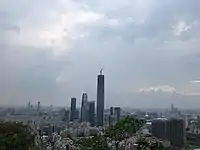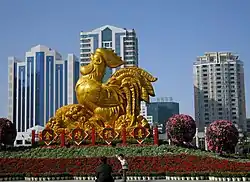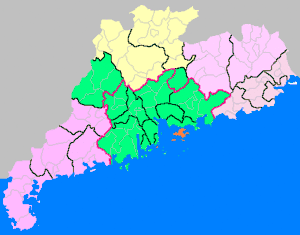Zhaoqing
肇庆市 | |
|---|---|
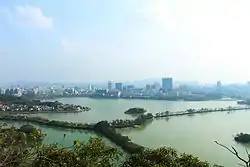 Panorama view of Duanzhou District and Seven Star Crags | |
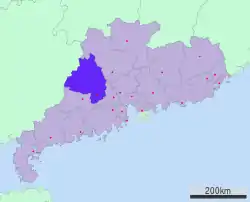 Location of Zhaoqing City jurisdiction in Guangdong | |
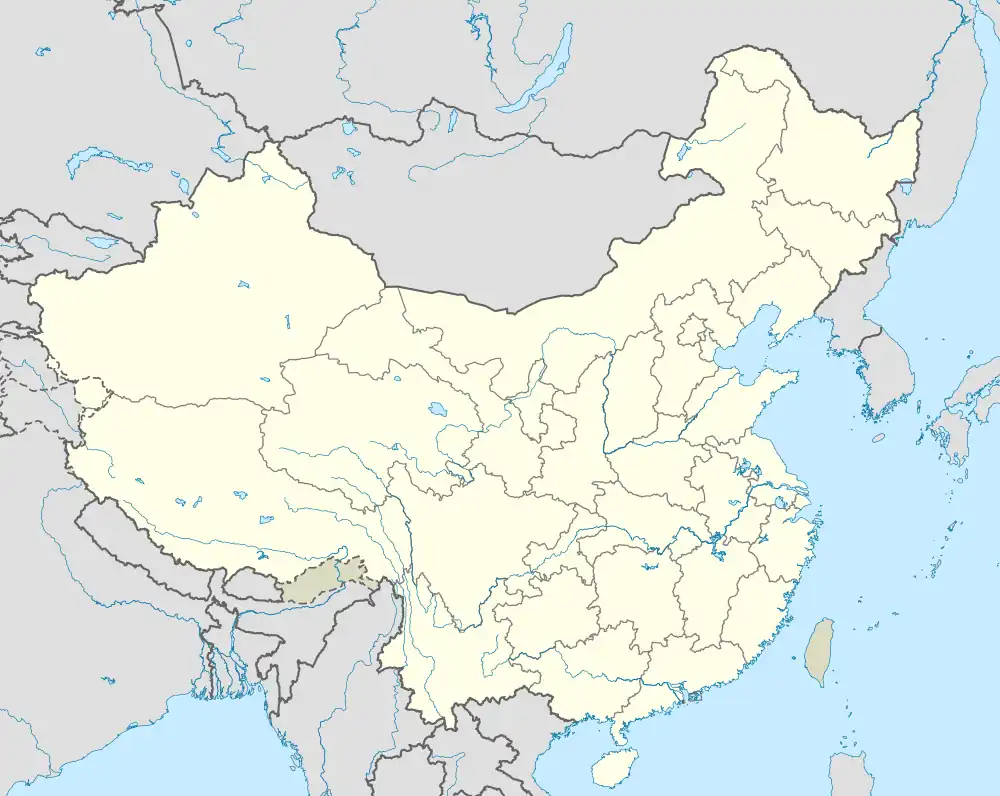 Zhaoqing Location in China | |
| Coordinates (Zhaoqing government): 23°3′N 112°28′E / 23.050°N 112.467°E | |
| Country | People's Republic of China |
| Province | Guangdong |
| County-level divisions | 8 |
| Municipal seat | Duanzhou District |
| Area | |
| • Prefecture-level city | 14,891.23 km2 (5,749.54 sq mi) |
| • Urban | 2,892 km2 (1,117 sq mi) |
| • Metro | 2,892 km2 (1,117 sq mi) |
| Elevation | 12 m (39 ft) |
| Population (2020 census)[1] | |
| • Prefecture-level city | 4,113,594 |
| • Density | 280/km2 (720/sq mi) |
| • Urban | 1,553,109 |
| • Urban density | 540/km2 (1,400/sq mi) |
| • Metro | 1,553,109 |
| • Metro density | 540/km2 (1,400/sq mi) |
| Time zone | UTC+8 (China Standard) |
| Area code | 0758 |
| ISO 3166 code | CN-GD-12 |
| License Plate | 粤H |
| Major Nationalities | Han |
| Website | Zhaoqing official site |
| Zhaoqing | |||||||||||||||||||||||||||||||
|---|---|---|---|---|---|---|---|---|---|---|---|---|---|---|---|---|---|---|---|---|---|---|---|---|---|---|---|---|---|---|---|
.svg.png.webp) "Zhaoqing" in Simplified (top) and Traditional (bottom) Chinese characters | |||||||||||||||||||||||||||||||
| Simplified Chinese | 肇庆 | ||||||||||||||||||||||||||||||
| Traditional Chinese | 肇慶 | ||||||||||||||||||||||||||||||
| Hanyu Pinyin | Zhàoqìng | ||||||||||||||||||||||||||||||
| Cantonese Yale | Siuhhing | ||||||||||||||||||||||||||||||
| Postal | Shiuhing | ||||||||||||||||||||||||||||||
| Literal meaning | "Beginning Auspiciousness" | ||||||||||||||||||||||||||||||
| |||||||||||||||||||||||||||||||
| Former names | |||||||||||||||||
|---|---|---|---|---|---|---|---|---|---|---|---|---|---|---|---|---|---|
| Gaoyao | |||||||||||||||||
| Chinese | 高要 | ||||||||||||||||
| Hanyu Pinyin | Gāoyào | ||||||||||||||||
| |||||||||||||||||
| Duanzhou | |||||||||||||||||
| Chinese | 端州 | ||||||||||||||||
| Hanyu Pinyin | Duānzhōu | ||||||||||||||||
| |||||||||||||||||
Zhaoqing (Chinese: 肇庆), alternately romanized as Shiuhing,[note 1] is a prefecture-level city in Guangdong Province, China. As of the 2020 census, its population was 4,113,594, with 1,553,109 living in the built-up (or metro) area made of Duanzhou, Dinghu and Gaoyao.[1] The prefectural seat—except the Seven Star Crags—is fairly flat, but thickly forested mountains lie just outside its limits. Numerous rice paddies and aquaculture ponds are found on the outskirts of the city. Sihui and the southern districts of the prefecture are considered part of the Pearl River Delta.
Formerly one of the most important cities in southern China, Zhaoqing lost its importance during the Qing dynasty and is now primarily known for tourism and as a provincial "college town". Residents from Guangzhou, Shenzhen, and the other cities of the Pearl River Delta often visit it for weekend excursions. It is also a growing manufacturing center.
Name
Zhaoqing was known to the Qin and Han as Gaoyao (高要). It was renamed Duanzhou (端州) from its role as the seat of Duan Prefecture under the Sui. The present name, meaning "Beginning Auspiciousness", was bestowed on the area by Emperor Huizong of the Song in 1118. "Zhaoqing" is the pinyin romanization; the earlier Postal Map form "Shiuhing" derives from the name's Cantonese pronunciation.
History
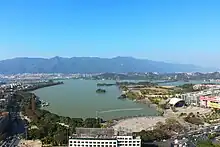


Gaoyao was located on the south bank of the Xi River, named for its district's principal feature: the river's Lingyang Gorge (then known as "Gaoyao"). In the late 6th and early 7th centuries, the administration was relocated to Duanzhou on the opposite bank of the river, which became an important administrative and military center of the southern Sui Empire.
The city wall of Zhaoqing was built in Duanzhou during the reign of Emperor Renzong of Song (1022-1063).
When the Portuguese arrived in the 16th century, Zhaoqing was still an important center, serving as the seat of the Viceroy of Liangguang (Guangdong and Guangxi).[3] Matteo Ricci's On the Christian Expedition among the Sinae tells of the early visits of Macanese-based Europeans to Zhaoqing. The Viceroy Chen Rui (陈瑞)[note 2] summoned Macao's mayor and bishop in the early 1580s, but the town sent its auditor Mattia Penella and the Italian Jesuit Michele Ruggieri in their place in 1582.[4] After several false starts, Ruggieri and Matteo Ricci were allowed to establish their residence in the city, the first Jesuit mission house on mainland China, after Zhaoqing's governor Wang Pan learned of Ricci's skill as a mathematician and cartographer. Ricci drew the first modern Chinese map of the world in Zhaoqing in 1584. Ruggieri left for Rome in 1588 but Ricci remained until the next year, when a new viceroy expelled him from the city and obliged the Jesuits to relocate to Shaozhou (now Shaoguan).[5]
During the Fall of the Ming in the mid-17th century, Zhaoqing served as the capital of the Prince of Gui's Southern Ming resistance, with the prince styling himself the Yongli Emperor. The town fell in 1650 and the prince relocated to Guilin and then various locations in Guangxi, Yunnan, and Burma. The Jesuits Andreas Wolfgang Koffler and, later, Michał Boym stayed for some time at his court.[6][7]
The Qing viceroy of Liangguang relocated to Guangzhou but Zhaoqing remained a commandery seat, overseeing the counties of Gaoyao, Guangning, Deqing, Sihui, and Kaijian and Fengchuan (since combined into Fengkai); Gaoming (now part of Foshan); Xinxing (now part of Yunfu); Heshan, Kaiping, and Enping (now part of Jiangmen); and Yangchun and Yangjiang (now part of Yangjiang's separate prefecture).[2]
Geography
Zhaoqing is located 110 km (68 mi) west of Guangzhou, in the west Pearl River Delta. It lies on the north shores of the Xi River, which flows from west to east, and opposite of Gaoyao. A plain area lies to the south and west of Zhaoqing, with mountains to the east and north.
Climate
The city has a monsoon-influenced humid subtropical climate (Köppen climate classification Cfa). The yearly average temperature is 22.69 °C (72.8 °F), and annual precipitation is 1,633 mm (64.3 in).
| Climate data for Zhaoqing (1981–2010 normals, extremes 1971–2010) | |||||||||||||
|---|---|---|---|---|---|---|---|---|---|---|---|---|---|
| Month | Jan | Feb | Mar | Apr | May | Jun | Jul | Aug | Sep | Oct | Nov | Dec | Year |
| Record high °C (°F) | 28.7 (83.7) |
31.4 (88.5) |
32.4 (90.3) |
35.7 (96.3) |
36.1 (97.0) |
37.9 (100.2) |
38.5 (101.3) |
38.7 (101.7) |
38.3 (100.9) |
35.8 (96.4) |
33.1 (91.6) |
30.0 (86.0) |
38.7 (101.7) |
| Mean daily maximum °C (°F) | 18.2 (64.8) |
20.4 (68.7) |
22.3 (72.1) |
26.3 (79.3) |
30.0 (86.0) |
31.9 (89.4) |
33.4 (92.1) |
33.3 (91.9) |
31.7 (89.1) |
29.2 (84.6) |
24.6 (76.3) |
20.2 (68.4) |
26.8 (80.2) |
| Daily mean °C (°F) | 14.2 (57.6) |
16.4 (61.5) |
18.6 (65.5) |
22.6 (72.7) |
26.0 (78.8) |
27.8 (82.0) |
29.0 (84.2) |
28.9 (84.0) |
27.7 (81.9) |
25.1 (77.2) |
20.2 (68.4) |
15.8 (60.4) |
22.7 (72.9) |
| Mean daily minimum °C (°F) | 11.3 (52.3) |
13.6 (56.5) |
15.9 (60.6) |
20.0 (68.0) |
23.2 (73.8) |
25.0 (77.0) |
25.8 (78.4) |
25.8 (78.4) |
24.6 (76.3) |
21.8 (71.2) |
16.7 (62.1) |
12.5 (54.5) |
19.7 (67.4) |
| Record low °C (°F) | 2.3 (36.1) |
1.7 (35.1) |
4.4 (39.9) |
9.2 (48.6) |
14.9 (58.8) |
19.3 (66.7) |
22.7 (72.9) |
20.7 (69.3) |
15.9 (60.6) |
10.9 (51.6) |
5.3 (41.5) |
1.0 (33.8) |
1.0 (33.8) |
| Average precipitation mm (inches) | 44.8 (1.76) |
63.6 (2.50) |
88.5 (3.48) |
181.9 (7.16) |
258.8 (10.19) |
274.7 (10.81) |
229.1 (9.02) |
209.2 (8.24) |
153.6 (6.05) |
61.0 (2.40) |
38.9 (1.53) |
28.9 (1.14) |
1,633 (64.28) |
| Average precipitation days (≥ 0.1 mm) | 8.2 | 12.3 | 15.9 | 17.4 | 19.9 | 18.9 | 17.2 | 17.4 | 12.4 | 6.7 | 5.5 | 5.3 | 157.1 |
| Average relative humidity (%) | 71 | 76 | 80 | 82 | 79 | 82 | 79 | 79 | 75 | 69 | 67 | 66 | 75 |
| Source 1: China Meteorological Data Service Center[8] | |||||||||||||
| Source 2: Weather China (precipitation days 1971–2000)[9] | |||||||||||||
Administration
Zhaoqing has jurisdiction over 3 districts, 4 counties and 1 County-level city:
| Map | |||||
|---|---|---|---|---|---|
| Name | Simplified Chinese | Hanyu Pinyin | Population (2010 census) |
Area (km2) |
Density (/km2) |
| Duanzhou District | 端州区 | Duānzhōu Qū | 479,342 | 153.99 | 3,113 |
| Dinghu District | 鼎湖区 | Dǐnghú Qū | 164,690 | 552.39 | 298 |
| Gaoyao District | 高要区 | Gāoyào Qū | 753,120 | 2,185.62 | 345 |
| Guangning County | 广宁县 | Guǎngníng Xiàn | 423,941 | 2,455.46 | 173 |
| Huaiji County | 怀集县 | Huáijí Xiàn | 813,032 | 3,554.07 | 229 |
| Fengkai County | 封开县 | Fēngkāi Xiàn | 398,258 | 2,723.93 | 146 |
| Deqing County | 德庆县 | Déqìng Xiàn | 341,211 | 2,002.8 | 170 |
| Sihui | 四会市 | Sìhuì Shì | 542,873 | 1,262.96 | 430 |
Economy
Located in the Pearl River Delta, Zhaoqing is one of the 9 prefecture-level cities in the Pearl River Delta Economic Zone (include Zhaoqing urban area, Dinghu, Gaoyao and Sihui only).
Primary industries
The rich local resources within the mountainous regions include coal, limestone, copper, lead, zinc, granite, gold, sulfur, gypsum and other minerals.
In the agriculture sector, the fertile plains yield paddy rice, sugar cane, aquatic products, fruits, rosin and cassia bark. Horticulture and farming contribute greatly to the local economy. The industries of Poultry farming and animal husbandry are also seeking to modernize their technology and management.
The forests in the mountainous regions of the city provide a rich source for herbal medicines and other materials like rosin and casia bark that are harvested from various forest plants.
Secondary industries
Food and beverages, building materials, electronics, micro bioengineering, chemicals, equipment and machinery, textile and garments are the pillar industries. Duanzhou, Gaoyao and Sihui area being developed as the export-oriented industrial bases. Yunfu is a major area for the production of sulfur and iron.
To facilitate industrial development in Zhaoqing, the local government has made great efforts in establishing various industrial zones / parks in the city. The largest one is the Guangdong Zhaoqing High-tech Industrial Development Zone, with an area of 109 km2 (42 sq mi), that consists of two industrial parks, Sanrong Industrial Park and Dawang Industrial Park, of areas 9 km2 (3.5 sq mi) and 100 km2 (39 sq mi) respectively. Dawang is facilitated as an export processing and trade zone.
Education
The city government of Zhaoqing is currently seeking to improve its higher education system and preserve cultural resources. Zhaoqing has a university and is also home to a campus of Guangdong University of Finance. There is also Zhaoqing Foreign Language College, a Canadian-American School and numerous other schools including those specializing in foreign language study.
Colleges and universities
- Zhaoqing University
- Zhaoqing Foreign Language College
- Guangdong College of Business and Technology
- Zhaoqing Financial University
Transportation
Zhaoqing is served by railways and highways. Direct train and bus services connect it to Guangzhou, Hong Kong and other cities in Guangdong. Major roadways include Interstates 321 and 324 and the Guang-Zhao and Guang-Wu Expressways. The Sanmao Railway also runs through Zhaoqing. It is connected with Hong Kong via the KCRC Guangdong Through Train service from Zhaoqing railway station. Hong Kong owned and based Chu Kong Passenger Transport Co., Ltd also runs daily express catamaran ferries between Zhaoqing and Hong Kong.
Within the city, the primary form of public transportation is the 32 public bus routes and 2 sightseeing routes.
Sports
The 15th Games of Guangdong Province
Zhaoqing was the hosting city of the 15th Games of Guangdong Province[10] on August 8, 2018.
Marathon
Zhaoqing has held 3 marathons since 2016. The first two year consisted only half-marathon. In 2018, the event for the first time consisted both full marathon and half marathon. In 2019, Zhaoqing will hold the 4th Zhaoqing International Marathon[11] estimably in Q2.
High diving
In 2018, the Zhaoqing Yingxiong High Diving Training Center, which contains the first year-round regulation-size high diving platform,[12] opened at the Zhaoqing Sports Center. This venue would go on to host the FINA High Diving World Cup 2019.[13]
Notes
References
Citations
- 1 2 Guăngdōng: Prefectures, Cities, Districts and Counties
- 1 2 Bolton & al. (1941), p. 262.
- ↑ De Christiana expeditione apud Sinas, Book Two, Chapter 3. Pages 136 in the English translation: Louis J. Gallagher (1953). "China in the Sixteenth Century: The Journals of Matteo Ricci", Random House, New York, 1953. The original Latin text by Nicolas Trigault, De Christiana expeditione apud Sinas suscepta ab Societate Jesu, can be found on Google Books.
- ↑ Gallagher (trans.), p. 136.
- ↑ Gallagher (trans.), pp. 205-229.
- ↑ Andreas Wolfgang Koffler in The Dictionary of the Ming Biography, pp. 722-723
- ↑ Mungello, David E. (1989). Curious Land: Jesuit Accommodation and the Origins of Sinology. University of Hawaii Press. p. 139. ISBN 0-8248-1219-0.
- ↑ 中国地面气候标准值月值(1981-2010) (in Chinese (China)). China Meteorological Data Service Center. Retrieved 21 November 2022.
- ↑ 肇庆 - 气象数据 -中国天气网 (in Chinese). Weather China. Retrieved 27 November 2022.
- ↑ 15th Games of Guangdong Province
- ↑ 4th Zhaoqing International Marathon
- ↑ "VIDEO: Zhao Qing High Diving Stadium Opens In China". Swimming World News. 2018-12-08. Retrieved 2019-05-26.
- ↑ "Zhaoqing ready for the FINA High Diving World Cup 2019 – Xinhua | English.news.cn". www.xinhuanet.com. Archived from the original on May 26, 2019. Retrieved 2019-05-26.
Sources
- Bolton, Kingsley; Hutton, Christopher (1941), Triad Societies, Vol. 5, Abingdon: Routledge, ISBN 9780415243971, reprinted 2000.
External links
- Zhaoqing Government website
- Zhaoqing University website (in Chinese and English)
- Zhaoqing Foreign Language College website
- Guangdong University of Finance website (in Chinese and English)
- News Guangdong Zhaoqing page
- The Zhaoqing Ricci center
- Matteo Ricci and his contributions to science in China
- Map of the city center
- Chu Kong Passenger Transport Co. Ltd.



